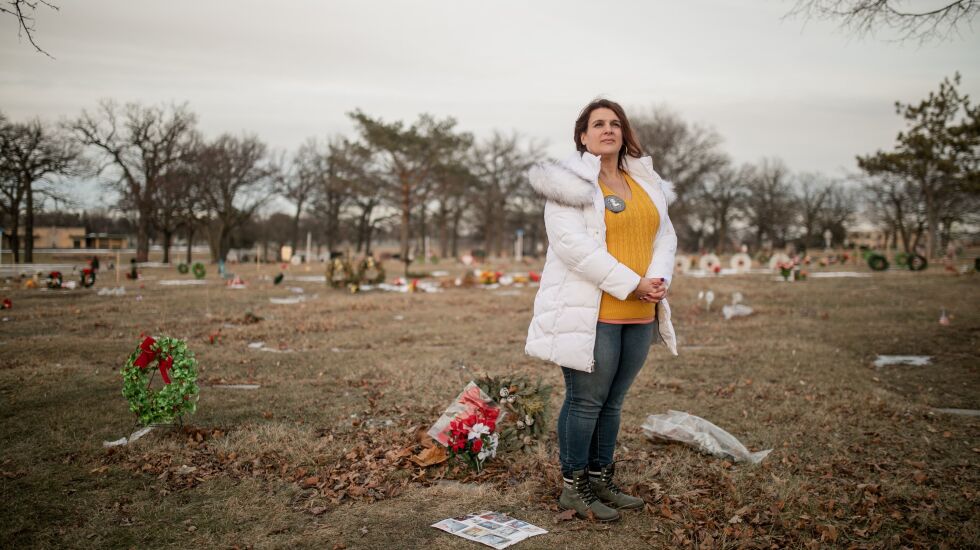
Rosa Sanders and Carmela Richardson have never met, but they are united in refusing to back down as they seek justice for their sons lost to gun violence.
For Sanders, the holiday season is especially difficult. Kevin Anthony Sanders was 15 when he was gunned down days before Thanksgiving in 2010, just steps from his home in Cicero.
Late last year, I came across a post from Sanders on Facebook and reached out to her. At the time, the case had been unsolved for 11 years.
The initial focus for my story wasn’t the length of time without a break in the case, but how Kevin was remembered by those who loved him. I had learned from my professor and mentor while I was a student at Roosevelt University, former Sun-Times columnist John W. Fountain, about the importance of humanizing a story.
I listened as Sanders somberly described watching Kevin and his younger sister Taylor Sanders open presents on Christmas morning when they were children, or planning a birthday party for Kevin at a bowling alley.
But during one of my first interviews with Sanders, she described her frustration with the Cicero Police Department and the lack of answers given in her son’s case.
When I reached out to the police department for a response, the chief at the time, Jerry Chlada, emphasized the case was still unsolved because of a lack of evidence — not a lack of police work.
He said detectives had reopened the case at least three times, conducted lie detector tests and searched her son’s phone records — all without an answer.
Chlada said he understood why Sanders “didn’t want to hear anything other than her son’s case has been solved.”
From 2012 to late 2022, more than 40 homicides were reported in Cicero, according to police department data. Detectives had made an arrest in 70% of cases.
As the story progressed, I was struck by Sanders’ journey through grief. She was willing to share how traumatized her son’s murder had left her. It pushed her to question her faith, and she admitted at times she didn’t want to go on with her life.
Her voice was hoarse as she’d described driving on the side of the expressway and asking herself what would happen if she drove off the bridge.
Despite her struggles, Sanders found strength in her children. And though there have been no arrests in the 12 years since her son was murdered, Sanders is still hopeful. “I say it every year. Pray again, pray to God for justice in the new year,” she said. “I hang onto that hope that it happens.”
Covering Kevin’s murder was different than many of the homicides I’ve written about because it was close to home. He was murdered in the 1600 block of 55th Court, just a few miles from where I grew up in Cicero.
Another mom grieves — this one in Chicago
While I was working on that story, Carmela Richardson reached out to me with an update on her own son’s case. Myron Richardson, 19, was found shot to death in a burning car in July 2021 in the 12100 block of South Doty Avenue on the Far Southeast Side of Chicago.
I had first written about Carmela Richardson’s struggles to get answers from the Chicago Police Department about his slaying, around the time I began my professional journalism career at the Sun-Times.
A few months later, Myron’s half-brother, Darius Dawson, was arrested after officers linked him to the murder through cellphone tower data and video surveillance footage. Dawson was charged with concealment of a homicide, according to court records, and was ordered held on $1 million bond. He has pleaded not guilty in the case, according to court records.
But Carmela Richardson was devastated Dawson wasn’t charged with first-degree murder.
“I feel like the justice I’m seeking for Myron, I’ll never get it,” she said. “It feels like they just don’t care.”
A police spokesperson didn’t respond when I asked if there were any updates in the investigation. Police told Richardson previously there wasn’t enough evidence to charge Dawson with murder, she said.
In addition to seeking to have the charges upgraded, Richardson is pressing to have a portion of Doty Avenue where her son’s body was found named after him, and she’s asking city officials to make the street safer by adding cameras and lights. So far, she hasn’t had much luck.
As I was working on a follow-up story, my editor, Dan Haar, suggested making “the road to justice” the central point of the narrative, both in a literal and metaphorical sense. Not only was Richardson trying to rename Doty Avenue in Myron’s honor, but she was also on this “justice-seeking path” for her son, herself and her family.
“My kids deserve to know that the person who took their brother is going to be put away for the rest of their lives,” Richardson said. “I don’t want to let them down.”
Like Sanders, Richardson described her mental anguish in the months after her son’s death.
Several times during my interviews with Richardson, she needed to take a second to breathe or would break into tears when remembering Myron.
“It gets harder to wake up and do normal things,” she said.
After the story was published, Richardson called to thank me.
Although covering murder and other tragedies can be draining, my interactions with Richardson and Sanders remind me why I decided to pursue a career in journalism.
“I have been in this depressive state of mind since the last court date, feeling like I have exhausted all avenues, and [I’m] trying to figure out my next move,” Richardson texted to me, “and then you come like you do, and that’s why you’re a part of my family forever.”
Mohammad Samra is a Sun-Times wire reporter.







